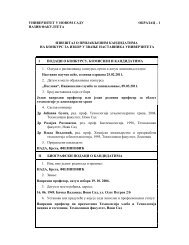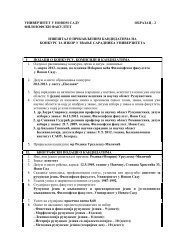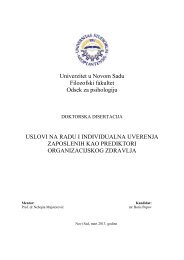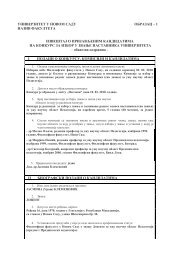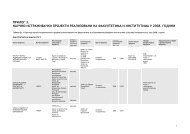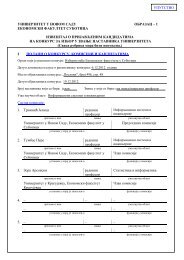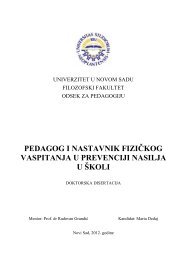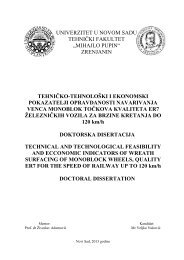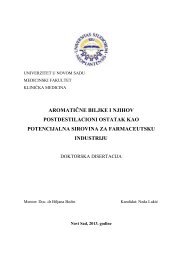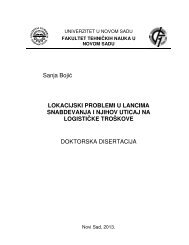Intercultural competence as an aspect of the communicative ...
Intercultural competence as an aspect of the communicative ...
Intercultural competence as an aspect of the communicative ...
Create successful ePaper yourself
Turn your PDF publications into a flip-book with our unique Google optimized e-Paper software.
The ‘common sense’ notion that foreign l<strong>an</strong>guage learning <strong>an</strong>d travel abroad<br />
could create ‘toler<strong>an</strong>ce <strong>of</strong> o<strong>the</strong>rness’ h<strong>as</strong> its roots in <strong>the</strong> ‘notion <strong>of</strong> all hum<strong>an</strong> experience<br />
having, at some fundamental level, common ground’ (Byram 1989: 57). However, if<br />
students set out with <strong>the</strong> positive impression that ‘people are <strong>the</strong> same wherever you go’,<br />
<strong>the</strong> meeting <strong>of</strong> cultures c<strong>an</strong> create resist<strong>an</strong>ce <strong>an</strong>d prejudice because learners would<br />
invariably notice differences where a similarity w<strong>as</strong> expected. What should be <strong>an</strong>alysed<br />
<strong>an</strong>d where similarities should be pursued is how global concepts – respect for elders,<br />
gender roles, or expression <strong>of</strong> humour for example, are differently tr<strong>an</strong>sformed <strong>an</strong>d<br />
adapted in different cultures. If learners remain on a superficial level <strong>of</strong> only being<br />
acquainted with o<strong>the</strong>r cultures without reflecting on <strong>the</strong>ir experience, even when <strong>the</strong>y<br />
‘report a positive experience, [it] doesn’t guar<strong>an</strong>tee that <strong>the</strong>y have learned much about <strong>the</strong><br />
new environment or that <strong>the</strong>y have had a particularly deep experience’ (Shaules 2007: 83-<br />
84).<br />
Research question 3<br />
In order to see whe<strong>the</strong>r <strong>the</strong> English l<strong>an</strong>guage students differed in <strong>the</strong>ir <strong>an</strong>swers<br />
from <strong>the</strong> students <strong>of</strong> o<strong>the</strong>r departments at <strong>the</strong> University <strong>of</strong> Niš, <strong>the</strong>se <strong>an</strong>swers were<br />
compared. The research hypo<strong>the</strong>sis w<strong>as</strong> that <strong>the</strong> English l<strong>an</strong>guage students would have<br />
scored better in <strong>the</strong> GPI questionnaire. While some authors claim that l<strong>an</strong>guage<br />
instruction is not enough for intercultural <strong>competence</strong> <strong>an</strong>d higher sensitivity (Byram<br />
1997), <strong>the</strong> expectation w<strong>as</strong> that some difference would be seen in <strong>the</strong> results (not only due<br />
to <strong>the</strong> intense l<strong>an</strong>guage practice <strong>an</strong>d being immersed in l<strong>an</strong>guage <strong>an</strong>d some cultural<br />
elements on a daily b<strong>as</strong>is, but due to <strong>the</strong>ir <strong>as</strong>sumed motivation to study English). The<br />
<strong>an</strong>alysis showed that statistically signific<strong>an</strong>t differences between <strong>the</strong> English l<strong>an</strong>guage<br />
students <strong>an</strong>d <strong>the</strong> students <strong>of</strong> o<strong>the</strong>r departments on four variables: Identity, Responsibility,<br />
Well-Being <strong>an</strong>d Global citizenship. However, <strong>the</strong> values me<strong>an</strong>s <strong>of</strong> <strong>the</strong> English l<strong>an</strong>guage<br />
students were actually lower th<strong>an</strong> or <strong>the</strong> same <strong>as</strong> <strong>the</strong> me<strong>an</strong>s <strong>of</strong> o<strong>the</strong>r students. Since <strong>the</strong><br />
GPI authors claim that <strong>the</strong> higher <strong>the</strong> me<strong>an</strong> <strong>the</strong> clearer <strong>the</strong> sign <strong>of</strong> intercultural sensitivity,<br />
<strong>the</strong> results supported <strong>the</strong> line <strong>of</strong> thinking that l<strong>an</strong>guage instruction on its own did not give<br />
<strong>an</strong>y visible results in terms <strong>of</strong> intercultural <strong>competence</strong> <strong>an</strong>d sensitivity.<br />
The qualitative part <strong>of</strong> <strong>the</strong> study also confirmed this. In order to gain a better<br />
underst<strong>an</strong>ding <strong>of</strong> <strong>the</strong> group, three students <strong>of</strong> <strong>the</strong> English l<strong>an</strong>guage were interviewed,<br />
whose backgrounds <strong>an</strong>d contacts with foreign cultures were quite different. Two out <strong>of</strong><br />
three interviewees had only superficial contact with o<strong>the</strong>r cultures, while one spent <strong>an</strong><br />
202



